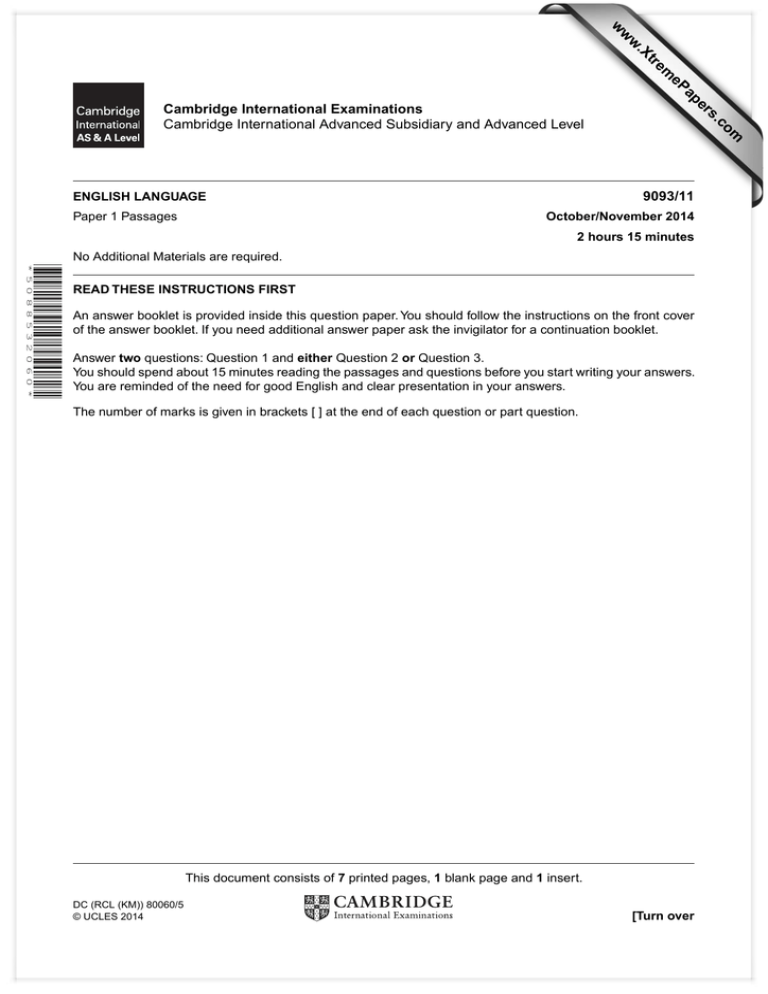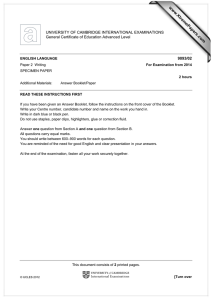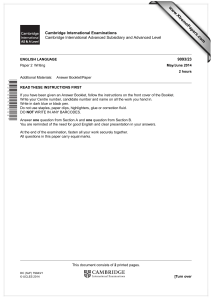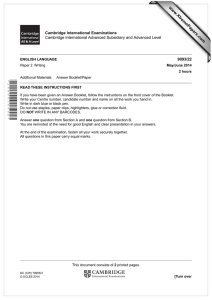
w
w
om
.c
s
er
9093/11
ENGLISH LANGUAGE
Paper 1 Passages
ap
eP
m
e
tr
.X
w
Cambridge International Examinations
Cambridge International Advanced Subsidiary and Advanced Level
October/November 2014
2 hours 15 minutes
No Additional Materials are required.
* 5 0 8 8 5 3 2 0 6 0 *
READ THESE INSTRUCTIONS FIRST
An answer booklet is provided inside this question paper. You should follow the instructions on the front cover
of the answer booklet. If you need additional answer paper ask the invigilator for a continuation booklet.
Answer two questions: Question 1 and either Question 2 or Question 3.
You should spend about 15 minutes reading the passages and questions before you start writing your answers.
You are reminded of the need for good English and clear presentation in your answers.
The number of marks is given in brackets [ ] at the end of each question or part question.
This document consists of 7 printed pages, 1 blank page and 1 insert.
DC (RCL (KM)) 80060/5
© UCLES 2014
[Turn over
2
Answer Question 1 and either Question 2 or Question 3.
1
The following text is taken from an account of the writer’s visit to Lagos in Nigeria, Africa.
(a) Comment on the ways in which language and style are used to convey the writer’s thoughts
and feelings.
[15]
(b) Later the writer produces an account of a similar event she attends in your own country.
Write a section of this account (between 120–150 words). Base your answer closely on the
style and features of the original extract.
[10]
It is Nigeria’s independence day and there is a flag—a shiny green, white, green—
fluttering from the Mercedes Benz in front of us. My brother Okey and I are driving
on Victoria Island, where real estate is expensive, although you would not guess so
from the pile of rubbish by the roadside, brightly colored bottles and plastic bags—
not aesthetically unpleasing, if you can forget that it is stinky rubbish. We’re in traffic.
I like to peer into people’s cars in Lagos traffic and imagine lives for them. Okey tries
to change lanes, but the other drivers nudge their cars forward as soon as there is a
slice of space between them and the next bumper. “Lagos drivers will never let you
enter,” Okey mutters. He has only recently moved to Lagos from the quieter Anambra
State. The week before, on his way to work, a rusty yellow bus swerved suddenly
and shattered his side mirror. The driver came out and lay flat on the ground, saying,
“You are a human being like me! You know I cannot do this on purpose!”
The Mercedes ahead of us crawls forward. Sellers are darting around—holding out
phone-recharge cards, packets of plantain chips, newspapers, plastic bottles of
orange dipped in water to make them look freshly cold. A young boy approaches
our car, armed with a spray bottle of soapy water and a rag. Okey turns on the
wipers, to discourage him, but the boy still squirts the water and makes to clean the
windscreen. Okey increases the wiper speed. The boy glares at him and moves to
the next car. The traffic is moving. I buy a TW magazine—a pretty, photoshopped
newscaster is on the cover—from one of the sellers who also pushes last month’s
American Cosmo and British Elle against my window. TW is published by my friend
Adesuwa, and Okey and I are going to an event to mark the second year of its
publication. I like Adesuwa’s magazine because it doesn’t do the kind of blind
borrowing from America that a lot of other women’s magazines do in Nigeria; it
doesn’t have recipes for broccoli or asparagus, or articles about junior and senior
proms.
The venue is Fantasy Land, a small amusement park, the sort of place children are
taken to see Father Christmas in December. But this time there are chairs arranged
around an elevated stage, covered in gauzy white cloth, tied with ribbons, festive,
almost wedding-like. The guests are mostly women, and all the ushers are in tight
jeans and T-shirts that say TW IS 2. We sing the national anthem, an unusual way
to start an event (prayers are the norm), but it is our independence day, after all.
I notice that the woman in front of me, who is wearing large gold earrings, does
not know the words of the anthem. Okey leans in to ask if I think we will recite the
pledge, too, and if we will have to raise a hand in a salute as we did in primary
school. We don’t recite the pledge. Instead Adesuwa climbs up to the stage. She is
shapely and chic in her jeans and high heels.
“God has been faithful to me,” she says. “I attribute it all to God. Please clap for
God!”
© UCLES 2014
9093/11/O/N/14
5
10
15
20
25
30
35
3
Everyone claps furiously. They look at the person next to them to make sure they, too,
are clapping for God. And because I am thinking of writing this letter from Lagos, I
decide then that the first line should be this: Lagos is all about God—and also about
cologne and phones. People walk past you and then follows the cloud of perfume or
cologne; with smelling good for the average Lagosian, subtlety is not the point. And
everyone is holding a phone. Phone conversations go on in the row behind me, in
the row ahead, mostly repetitions of “Eh? I can’t hear you. The network is bad.”
There is a comedian on stage. People are laughing. He introduces Waje.
Contemporary Nigerian music is exploding and the comedian tells us she is the
“next big thing.” She is a young woman whose stage outfit, a winged skirt, makes
her look like a butterfly. She sings in Igbo1, in a voice so clear it startles, and then
follows a sort of disco performance with lots of prancing about. Obiwon comes on
stage. He is better known than Waje but still not famous enough to be played on the
FM stations often. He has clearly watched a lot of Michael Jackson. He is slender
and is wearing a white jacket and elegant black trousers. He slides and shimmies
and his song, “Obim,” is one of the most beautiful I have ever heard. People are
standing up to sway along. I stand, too, and feel, for a moment, that odd sense of
liking people I don’t know.
1 Igbo:
© UCLES 2014
40
45
50
55
one of the main languages spoken in Nigeria
9093/11/O/N/14
[Turn over
4
2
The following text is taken from an online review of a mobile phone. The reviewer treats the mobile
phone as if it were a contestant in the international television programme The X Factor, in which
judges assess performers who wish to become stars in the music world.
(a) Comment on the ways in which language and style are used to portray the features and
qualities of the mobile phone.
[15]
(b) Another writer produces a positive review of the same mobile phone.
Write a section of this review (between 120–150 words). Base your answer closely on the
material of the original extract.
[10]
Verdict
You can blame it on stage fright, but when the lights go up, the 5217 pales in
comparison to rival budget phones. Despite its self-proclaimed star quality, it just
doesn’t have the X factor to win our vote.
We might have our quibbles about their performance in the high-end smart phone
market, but one thing the crazy company knows how to do is bring affordable, easyto-use mobiles to the masses. Well masses, get ready to celebrate, because we’re
here to review the 5217. It also comes in a talented X Factor-themed version, so
we’re giving this review an X Factor theme, too.
Enter stage right
5
10
Hello and welcome to the tech auditions. We’ve gathered the world’s cruellest, most
heartless tech judges together to shatter the dreams of aspiring gadgets from all
over the country. Without further delay, let’s meet our first performer: the 5217 mobile
telephone.
The 5217 hails from a little-known European country, and has the dream of bringing
happiness to mobile-hungry people with its 3.2-inch resistive touchscreen, built-in
accelerometer and 2-megapixel camera. Will that support be enough to impress our
judges?
15
FIND OUT AFTER THE BREAK.
Fat lip
20
Stood trembling before us on stage, we have to say the 5217 isn’t much of a looker.
Rather chunky at 111 by 51.7 by 15.5 mm, this mobile doesn’t have the rockstar
chic of more slender handsets, and it’s liable to bulk out your pocket somewhat if
you stuff it in your jeans. With a dull, silvery sheen covering the front and back of the
handset, there’s not a great deal of glamour to go around, either. The sourest note
is an ugly plastic lip that surrounds the 5217’s faceplate, and really breaks up what
could have been a smooth, sleek design.
Around the edges of this frumpy phone you’ll find mechanical volume keys, a
camera button, power switch, 3.5 mm socket for headphones, micro-USB port and
two covered ports for your SIM and microSD card.
So, not much of a looker then – our judges’ fingers are poised over the buzzers. But
looks can be deceiving, so we’re going to give the 5217 a chance.
© UCLES 2014
9093/11/O/N/14
25
30
5
Sadly, unlocking the 3.2-inch screen and revealing the display doesn’t give us too
much cause for celebration. When this mobile opens its mouth we can see that the
display is set quite far back from the actual screen. It’s a little disappointing because,
although the display is quite bright and offers a decent resolution (640 x 360 pixels),
that extra distance makes it look a little dull. Needless to say, photos and video on
this phone won’t look great. As far as the display goes, the 5217, it’s a ‘no’ from us.
The interface itself will be familiar to anyone who’s owned or used a similar phone
before. The layout is pretty simple and intuitive, which definitely works in this phone’s
favour. Even though it’s a resistive rather than capacitive touchscreen, we found
tapping out texts and navigating the phonebook was reasonably straightforward.
On the other hand, this phone falls flat as soon as you try and do anything a little
more complicated with it. The Web applications aren’t very intuitive, and they’re so
loaded with security pop-ups that doing anything in a hurry quickly becomes a real
pain. The only thing that stopped this mobile from being escorted from the stage
was a generous smattering of pre-loaded software, such as Facebook, MySpace
and Amazon apps. The 5217 definitely shows potential here, as we can see these
apps coming in handy.
What about the 5217’s 2-megapixel camera? Will it wow the judges? Or is this a
national embarrassment? We’ll tell you. AFTER THE BREAK. Ba bum bum.
35
40
45
50
Paparazzi
Welcome back. Before the break, we saw the 5217’s Web capabilities failing to
impress the judges. It’s dying on stage. Can the 5217’s camera tech save it from
elimination?
Actually, yes! The 2-megapixel snapper on the rear of this bad boy might not be
stage-stealing hardware on its own, but the camera software on offer here is
impressively swift. Affordable mobiles like this often pack fruit-throwingly terrible
software, creating a sluggish snapshot experience that prevents you from capturing
the moment. Not this shutterbug. We were equally impressed with the speed of the
camcorder app and the frame rate of recorded footage during playback.
The nifty camera might have distracted our judges momentarily, but the disappointing
lack of 3G and Wi-Fi connectivity is a dealbreaker. The final, unforgivable flaw of
this phone is that the only X Factor content included is a pre-installed app, which
shows you a few videos from the show before crashing spectacularly. Since there’s
obviously been so little effort made to theme this phone, we sort of wish we hadn’t
gone to so much trouble to write this tortuous themed review. Security, escort this
phone from the stage.
© UCLES 2014
9093/11/O/N/14
55
60
65
[Turn over
6
3
In the following text the writer describes his relatives’ experiences just before German forces
entered Vienna, in Austria, in 1938.
(a) Comment on the ways in which language and style are used to portray the events and
atmosphere of the day.
[15]
(b) Basing your answer closely on the style and features of the original extract, continue the
account (between 120–150 words). You do not need to bring the account to a close.
[10]
It is a flood of brown shirts. There are taxi horns blaring and there are men with
weapons on the streets, and somehow the police have swastika armbands. There
are trucks rushing along the Ring1, past the house, past the university towards the
Town Hall. And the trucks have swastikas on them, and the trams have swastikas on
them, and there are young men and boys hanging off them, shouting and waving.
5
And someone turns out the lights in the library, as if being in the dark will make
them invisible, but the noise reaches into the house, into the room, into their lungs.
Someone is being beaten in the street below. What are they going to do? How long
can you pretend this is not happening?
Some friends pack a suitcase and go out into the street, push through these swirling,
eddying masses of ecstatic citizens of Vienna to get to the Westbanhof. The night
train to Prague leaves at 11.15, but by nine it is completely packed. Men in uniforms
swarm through the train and pull people off.
By 11.15 Nazi flags are hanging from the parapets of government ministries. At
half-past midnight President Miklas gives in and approves the cabinet. At 1.08 a.m. a
Major Klausner announces from the balcony ‘with deep emotion in this festive hour
that Austria is free, that Austria is National Socialist.’
There are queues of people on foot or in cars at the Czech frontier. The radio is now
playing the Badenweiler and the Hofenfriedberger, German military marches. These
are interspersed with slogans. The first Jewish shop windows are broken.
10
15
20
And it is on that first night that the sounds of the street become shouting in the
courtyard, echoing around the walls and on the roof. There are feet pounding up the
stairs, the thirty-three shallow steps to the apartment on the second floor.
There are fists on the door, someone leaning on the bell, and there are eight or
ten, a knot of them in some sort of uniform – some with swastika armbands, some
familiar. Some are still boys. It is one o’clock in the morning and no one is asleep,
everyone is dressed. Viktor and Emmy and Rudolf are pushed into the library.
This first night they swarm through the apartment. There are shouts from across
the courtyard, as a couple of them have found the salon with its French ensembles
of furniture and porcelain. There is laughter from someone as Emmy’s closet is
ransacked. Someone bangs out a tune on the piano keys. Some men are in the
study pulling out drawers, roughing up the desks, pushing the folios off the stand
in the corner. They come into the library and tip the globes from their stands. This
convulsive disordering, messing up, is barely looting; it is a stretching of muscles, a
cracking of the knuckles, a loosening up. The people in the corridors are checking,
looking, exploring, working out what is here.
They take the silver candlesticks from the dining-room. Silver cigarette boxes, money
held in a clip from Viktor’s study. A small Russian clock, pink enamel and gold, that
© UCLES 2014
9093/11/O/N/14
25
30
35
7
rang the hours in the salon. And the large clock from the library with its golden dome
held up by columns.
The last door they reach is Emmy’s dressing-room in the corner, and they sweep
everything off the desk she uses as a dressing-table: the small mirror and the
porcelain and the silver boxes and the flowers sent up from the meadows, and they
drag the desk out into the corridor. They push Emmy and Viktor and Rudolf against
the wall, and three of them heave the desk and send it crashing over the handrail
until, with a sound of splintering wood and gilt and marquetry, it hits the stone flags
of the courtyard below.
40
45
This desk – the wedding present from Paris – takes a long time to fall. The sounds
ricochet off the glass roof. The broken drawers scatter letters across the courtyard.
It is not that you cannot sleep. You cannot go to bed. When these men and boys
finally go, they say that they’ll be back, and you know they mean it. Emmy is wearing
her pearls and they take them off. They take her rings. Someone pauses to spit
handsomely at your feet. And they clatter down the stairs, shouting until they reach
the courtyard. One takes a run to kick the debris, and they are out through the doors
onto the Ring, a large clock under an overcoated arm.
50
55
Snow is on its way.
All that day, squadrons of planes fly low over Vienna. Viktor and Emmy do not know
what to do. They do not know where to go, as that Sunday morning the first German
troops cross the border to be met with flowers and crowds. The story is that Hitler is
returning home to visit the grave of his mother.
1Ring :
© UCLES 2014
ring road
9093/11/O/N/14
60
8
BLANK PAGE
Copyright Acknowledgements:
Question 1
Question 2
Question 3
© Chimamanda Ngozi Adichie; Letter from Lagos, from The Panorama Book Review; http://www.mcsweeneys.net/articles/letter-from-lagos-fromthe-panorama-book-review.
© ed. Emma Bayly; Luke Westaway; Nokia 5228 X-Factor review; http://reviews.cnet.co.uk/mobile-phones/nokia-5228-x-factor-review-50001162.
© 2012 CBS Interactive Limited. All rights reserved.
Edmund de Waal; The Hare with Amber Eyes; © Edmund de Waal 2010; Published by Vintage. Reprinted by permission of the Random House
Group Ltd; 2011.
Permission to reproduce items where third-party owned material protected by copyright is included has been sought and cleared where possible. Every
reasonable effort has been made by the publisher (UCLES) to trace copyright holders, but if any items requiring clearance have unwittingly been included, the
publisher will be pleased to make amends at the earliest possible opportunity.
Cambridge International Examinations is part of the Cambridge Assessment Group. Cambridge Assessment is the brand name of University of Cambridge Local
Examinations Syndicate (UCLES), which is itself a department of the University of Cambridge.
© UCLES 2014
9093/11/O/N/14







